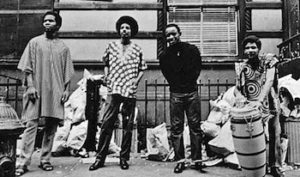
*The Last Poets were formed on this date in 1968. They were a progressive group of Black Nationalist poets and musicians that evolved from the late 1960s American Civil Rights movement.
Their name was taken from a poem by the South African revolutionary poet Keorapetse Kgositsile; the original users of that name were the trio of Felipe Luciano, Gylan Kain, and David Nelson. The Original Last Poets were formed on Malcolm X's birthday at Marcus Garvey Park in East Harlem. On October 24th, 1968, the group performed on the New York television program Soul! Luciano, Kain, Abiodun Oyewole, and Nelson recorded separately as The Original Last Poets, gaining some renown. In 1972, they appeared on Black Forum Records album Black Spirits - Festival Of New Black Poets In America with "And See Her Image In The River" and "Song of Ditla, part II," recorded live at the Apollo Theatre, Harlem, New York.
When Kain and Nelson then began to pursue other interests (theater and ministry, respectively), Abiodun Oyewole "recruited" Alafia Pudim (later known as Jalaluddin Mansur) and Umar bin Hassan as replacements. Following the success of the newly refigured Last Poets' first album, founding members Kain and Nelson got together with Luciano. It recorded their only album, Right On, in 1970, the soundtrack to a documentary movie of the same name that finally saw release in 1971. Following a legal issue between the two groups concerning ownership of the band's name, The Right On album was released under the group name The Original Last Poets to establish the founding members' primacy and distance themselves from the other group of the same name. Those men, along with poet Sulaiman El-Hadi and percussionist Nilaja Obabi, are considered the best-known members of the various lineups.
Having reached commercial success with its debut album, the Last Poets released the follow-up, This Is Madness, without then-incarcerated Oyewole. The album featured more politically charged poetry that resulted in the group being listed under the counter-intelligence program COINTELPRO during the Richard Nixon administration. Hassan left the group in time for Chastisement (1972). The album introduced a sound blending of jazz and funk instrumentation with poetry. The music further developed into free-jazz–poetry on the Blue Thumb album At Last (1973). In the 1980s and beyond, the group was often named the grandfathers and founders of the new Hip Hop movement, and their inspiration. They were also interviewed in the 1986 cult documentary Big Fun In The Big Town. Nuriddin and El-Hadi worked on several projects under the Last Poets name, including 1984's Oh My People and 1988's Freedom Express. In collaboration with Attorney Gregory J Reed, they reunited Original Poets in NY.
They were recorded as Poets live in Detroit's Orchestra Hall and produced "The Return of the Original Last Poets Docudrama" after 20 years in 1990, Scatterrap/Home, in 1994. The group, led by Hassan, also appeared in John Singleton's 1993 film Poetic Justice. Oyewole and Hassan began recording separately under the same name, releasing Holy Terror in 1995 (re-released on Innerhythmic in 2004) and Time Has Come in 1997. Meanwhile, Nuriddin released the solo CDs On The One (1996), The Fruits of Rap (1997), and Science Friction (2004) under the abbreviated name "Jalal." In 2005, the Last Poets had a collaboration where the trio Bin Hassan was featured with Common on the Kanye West-produced song "The Corner."
In 2011, Oyewole and Bin Hassan performed at The Jazz Cafe in London in a tribute concert to the late Gil Scott-Heron and all the former Last Poets. In 2014, Nuriddin performed there with Jazz Warriors, the first-ever live performance in 40 years of the now-iconic "Hustlers Convention". 2016 The Last Poets (World Editions, UK) was published. In 2018, The Last Poets released Understand What Black Is, their first album since 1997. The album featured tributes to late artists Prince and Biggie Smalls. The versions of the group led by Nuriddin and Bin Hassan had the largest impact on popular culture. The Last Poets were one of the earliest influences on hip-hop music. Critic Jason Ankeny wrote: "With their politically charged raps, taut rhythms, and dedication to raising Black consciousness, the Last Poets almost single-handedly laid the groundwork for the emergence of hip-hop."